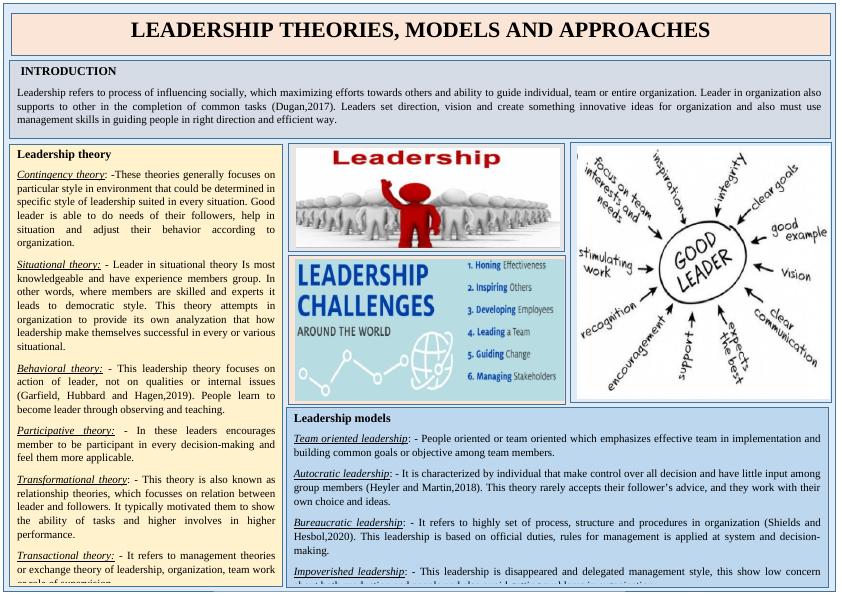Leadership Theories, Models and Approaches
Added on 2023-01-04
2 Pages826 Words48 Views
LEADERSHIP THEORIES, MODELS AND APPROACHES
INTRODUCTION
Leadership refers to process of influencing socially, which maximizing efforts towards others and ability to guide individual, team or entire organization. Leader in organization also
supports to other in the completion of common tasks (Dugan,2017). Leaders set direction, vision and create something innovative ideas for organization and also must use
management skills in guiding people in right direction and efficient way.
Leadership theory
Contingency theory: -These theories generally focuses on
particular style in environment that could be determined in
specific style of leadership suited in every situation. Good
leader is able to do needs of their followers, help in
situation and adjust their behavior according to
organization.
Situational theory: - Leader in situational theory Is most
knowledgeable and have experience members group. In
other words, where members are skilled and experts it
leads to democratic style. This theory attempts in
organization to provide its own analyzation that how
leadership make themselves successful in every or various
situational.
Behavioral theory: - This leadership theory focuses on
action of leader, not on qualities or internal issues
(Garfield, Hubbard and Hagen,2019). People learn to
become leader through observing and teaching.
Participative theory: - In these leaders encourages
member to be participant in every decision-making and
feel them more applicable.
Transformational theory: - This theory is also known as
relationship theories, which focusses on relation between
leader and followers. It typically motivated them to show
the ability of tasks and higher involves in higher
performance.
Transactional theory: - It refers to management theories
or exchange theory of leadership, organization, team work
or role of supervision.
Leadership models
Team oriented leadership: - People oriented or team oriented which emphasizes effective team in implementation and
building common goals or objective among team members.
Autocratic leadership: - It is characterized by individual that make control over all decision and have little input among
group members (Heyler and Martin,2018). This theory rarely accepts their follower’s advice, and they work with their
own choice and ideas.
Bureaucratic leadership: - It refers to highly set of process, structure and procedures in organization (Shields and
Hesbol,2020). This leadership is based on official duties, rules for management is applied at system and decision-
making.
Impoverished leadership: - This leadership is disappeared and delegated management style, this show low concern
about both production and people and also avoid getting problems in organization.
INTRODUCTION
Leadership refers to process of influencing socially, which maximizing efforts towards others and ability to guide individual, team or entire organization. Leader in organization also
supports to other in the completion of common tasks (Dugan,2017). Leaders set direction, vision and create something innovative ideas for organization and also must use
management skills in guiding people in right direction and efficient way.
Leadership theory
Contingency theory: -These theories generally focuses on
particular style in environment that could be determined in
specific style of leadership suited in every situation. Good
leader is able to do needs of their followers, help in
situation and adjust their behavior according to
organization.
Situational theory: - Leader in situational theory Is most
knowledgeable and have experience members group. In
other words, where members are skilled and experts it
leads to democratic style. This theory attempts in
organization to provide its own analyzation that how
leadership make themselves successful in every or various
situational.
Behavioral theory: - This leadership theory focuses on
action of leader, not on qualities or internal issues
(Garfield, Hubbard and Hagen,2019). People learn to
become leader through observing and teaching.
Participative theory: - In these leaders encourages
member to be participant in every decision-making and
feel them more applicable.
Transformational theory: - This theory is also known as
relationship theories, which focusses on relation between
leader and followers. It typically motivated them to show
the ability of tasks and higher involves in higher
performance.
Transactional theory: - It refers to management theories
or exchange theory of leadership, organization, team work
or role of supervision.
Leadership models
Team oriented leadership: - People oriented or team oriented which emphasizes effective team in implementation and
building common goals or objective among team members.
Autocratic leadership: - It is characterized by individual that make control over all decision and have little input among
group members (Heyler and Martin,2018). This theory rarely accepts their follower’s advice, and they work with their
own choice and ideas.
Bureaucratic leadership: - It refers to highly set of process, structure and procedures in organization (Shields and
Hesbol,2020). This leadership is based on official duties, rules for management is applied at system and decision-
making.
Impoverished leadership: - This leadership is disappeared and delegated management style, this show low concern
about both production and people and also avoid getting problems in organization.

End of preview
Want to access all the pages? Upload your documents or become a member.
Related Documents
Leadership Theories and Styleslg...
|5
|1418
|67
Leadership Theories: Situational and Transformationallg...
|10
|2113
|393
Leadership and Management - Assignmentlg...
|7
|1621
|45
Kurt Lewin Theory of Change Assignmentlg...
|9
|1998
|74
Leadership: Self Reflectionlg...
|8
|2590
|279
Leadership Reportlg...
|10
|2568
|46
